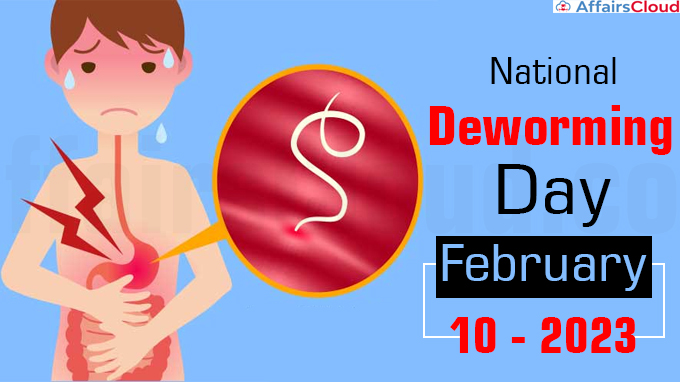 The National Deworming Day(NDD) is annually organised in all states and Union Territories (UTs) across India on February 10, with a mop-up day on February 15 with an aim to eradicate intestinal worms also referred to as Soil-Transmitted Helminths (STH), among children of age 1-19 years.
The National Deworming Day(NDD) is annually organised in all states and Union Territories (UTs) across India on February 10, with a mop-up day on February 15 with an aim to eradicate intestinal worms also referred to as Soil-Transmitted Helminths (STH), among children of age 1-19 years.
- The National Deworming Day(NDD) is conducted as a bi-annual round on 10th February and 10th August.
- The 1st round is conducted in February and the 2nd round is conducted in August.
Background:
i.The NDD is an initiative of the Ministry of Health and Family Welfare(MoH&FW), Government of India(GoI) which aims to ensure that every child in India is worm-free.
ii.In February 2015, the MoHFW launched the NDD as a part of the National Health Mission(NHM) in 11 states and UT: Assam, Bihar, Chhattisgarh, Dadra and Nagar Haveli, Haryana, Karnataka, Maharashtra, Madhya Pradesh, Rajasthan, Tamil Nadu, and Tripura.
- The first round of NDD was conducted in February 2015 and achieved coverage of 85%.
Note: This is one of the largest public health programs reaching a large number of children during a short period.
Implementation of NDD:
i.MoHFW is the nodal agency for providing all States and UTs with operational guidelines related to NDD implementation at all levels.
ii.NDD programmes are implemented through the efforts of the Department of School Education and Literacy under the Ministry of Education, Ministry of Women and Child Development(MoW&CD) and Ministry of Jal Shakti.
Soil-Transmitted Helminths (STH):
i.STH is the most common infection and affects the poorest and most deprived communities.
ii.Helminths (worms) are transmitted through soil contaminated with faecal matter are called soil-transmitted helminths (Intestinal parasitic worms). Roundworms (Ascaris lumbricoides), whipworms (Trichuris trichiura) and hookworms (Necator americanus and Ancylostoma duodenale) are worms that infect people.
iii.STH infections cause anaemia, malnutrition, impaired mental and physical & cognitive development, and reduced school participation.




